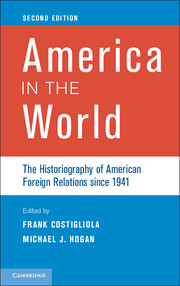Book contents
- Frontmatter
- Dedication
- Contents
- List of Contributors
- Preface
- 1 Introduction
- 2 The Charlie Maier Scare and the Historiography of American Foreign Relations, 1959–1980
- 3 Chaps Having Flaps: The Historiography of U.S. Foreign Relations, 1980–1995
- 4 Still Contested and Colonized Ground: Post–Cold War Interpretations of U.S. Foreign Relations during World War II
- 5 Recent Literature on Truman’s Atomic Bomb Decision
- 6 The Cold War
- 7 Cold War Presidents: Dwight D. Eisenhower, John F. Kennedy, Lyndon Baines Johnson, and Richard M. Nixon
- 8 The War that Never Ends: Historians and the Vietnam War
- 9 Culture and the Cold War: U.S.–Latin American Historiography since 1995
- 10 Impatient Crusaders: The Making of America’s Informal Empire in the Middle East
- 11 Explaining the Rise to Global Power
- 12 Bringing the Non-State Back In
- 13 Technology and the Environment in the Global Economy
- 14 U.S. Mass Consumerism in Transnational Perspective
- 15 A Worldly Tale
- Index
- References
14 - U.S. Mass Consumerism in Transnational Perspective
Published online by Cambridge University Press: 05 June 2014
- Frontmatter
- Dedication
- Contents
- List of Contributors
- Preface
- 1 Introduction
- 2 The Charlie Maier Scare and the Historiography of American Foreign Relations, 1959–1980
- 3 Chaps Having Flaps: The Historiography of U.S. Foreign Relations, 1980–1995
- 4 Still Contested and Colonized Ground: Post–Cold War Interpretations of U.S. Foreign Relations during World War II
- 5 Recent Literature on Truman’s Atomic Bomb Decision
- 6 The Cold War
- 7 Cold War Presidents: Dwight D. Eisenhower, John F. Kennedy, Lyndon Baines Johnson, and Richard M. Nixon
- 8 The War that Never Ends: Historians and the Vietnam War
- 9 Culture and the Cold War: U.S.–Latin American Historiography since 1995
- 10 Impatient Crusaders: The Making of America’s Informal Empire in the Middle East
- 11 Explaining the Rise to Global Power
- 12 Bringing the Non-State Back In
- 13 Technology and the Environment in the Global Economy
- 14 U.S. Mass Consumerism in Transnational Perspective
- 15 A Worldly Tale
- Index
- References
Summary
A mass consumerist ethos – driven by particular styles of resource use, production techniques, and advertising methods – became one of America’s most important and controversial contributions to the world. Despite the global impact of American-style consumerism – on people and on international politics – accounts of mass consumerism and of U.S. international (or transnational) relations have only recently addressed their overlapping historical themes.
This essay examines several different topics that lie at the intersections of histories of mass consumerism and international relations. Within each, it highlights historiographies that bring a global, historical perspective to the spread of U.S.-style consumerism and to the changing relationship between mass consumerism and America’s global power.
First, however, a definition is in order. Mass consumerism arises from and propels not only a variety of economic relationships but also complex codes of aspirations and desires. I define mass consumerism as a mass-production and mass-marketing system that imagines an ever-widening abundance of goods within a culture that emphasizes buying and selling, desire, glamour, and flexible, purchase-driven identities.
- Type
- Chapter
- Information
- America in the WorldThe Historiography of American Foreign Relations since 1941, pp. 307 - 337Publisher: Cambridge University PressPrint publication year: 2013
References
- 1
- Cited by

